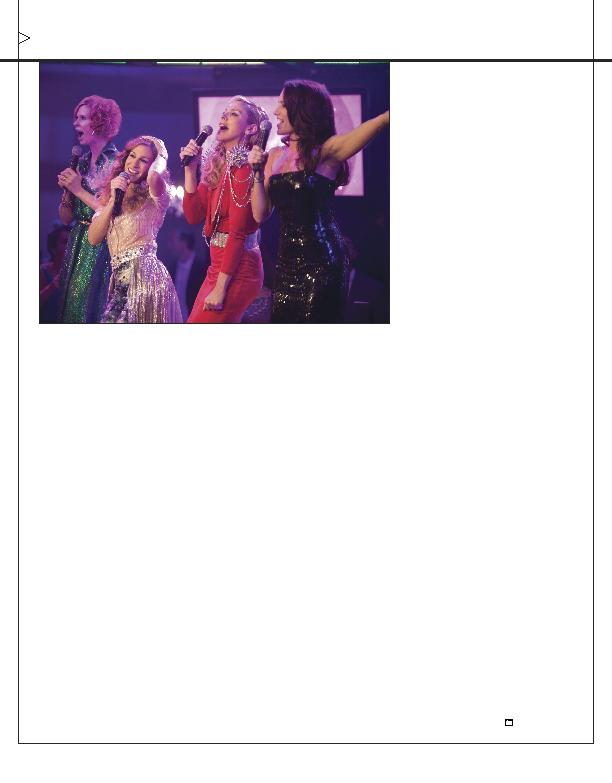
transform his hit series Sex and the City into a
movie, he expected to be met with skepticism.
"People would say, `What makes you think
this is a movie? Why can't you leave it
alone?'" King recalls. When the movie became
a blockbuster hit, with the biggest opening
weekend ever for an R-rated comedy, King
thought the critics were silenced. And they
were -- until he set out to pen a sequel, that
is. "Even my mother said to me, `Why would
you want to do that? It ended perfectly!'"
proach. "[In] the first movie, I wanted it to
be an epic, painful emotional movie that
spanned a year," King reveals. "This one, I
wanted the same characters but different
DNA. I wanted a big, fun movie." So while
the original film presented separate story-
lines for the four leading ladies, the sequel
gets them together and sends them far away
-- to the Middle East, in fact. "I wanted to
roles," King notes. "And the idea of Saman-
tha Jones (Kim Cattrall), the most overtly
sexually liberated American woman going to
a place that is in the midst of its own revolu-
tion appealed to me. Of course, there's going
to be a culture clash."
capist comedies," he notes. "And being in the
middle of an economic depression, I thought
people would want to see big, extravagant,
anti-depressing movies." While the film may
be the perfect "anti-depressant," it will also
tackle some heady issues for the foursome.
"Another theme I'm working with is the evo-
lution of these characters," he states. "Who
they were, who they are, who they might be.
Because the show evolved into a film and
we're evolving the film into a sequel -- evo-
lution is the name of the game. The only
place I could get into trouble with these char-
acters is if I didn't let them grow."
dio to do as he pleased. "My only taskmaster
is page count and the size of the movie," he
says, "which is actually a monster when you
consider I have four main characters." In fact,
King's biggest problem was overwriting. Hav-
ing begun his career on the verbose series
Murphy Brown, King has never had a problem
filling pages. "Diane English was my first en-
abler," he says of the comedy's creator. "If she
got a script under 55 pages for a half hour,
she would ask what was wrong." King was
also spoiled from being able to spread stories
over Sex and the City's six seasons and 94
episodes. "A lot of nuances had to fall away
from the film script," he says. "I've gotten
pretty good now at realizing you only need to
say something once. There were times where
I would tell myself not to even look over at
another character because I could have given
them a huge monologue and I didn't have
the page count."
He starts around 6:30 a.m. and takes a break
to hit the gym and grab lunch. When he re-
turns, he spends the afternoon polishing
what he's already written. King says he does-
n't suffer from writer's block, but rather what
he calls "writer's primal scream." He adds, "I
know that it's there and it will come. When
people ask me if I like writing, I say, `I like
having written.' But that feeling of waiting
for it to come creates anxiety." Ultimately, he
says deadlines are his friend. "They force me
to finish out of fear I'll be humiliated when
there's nothing on the page."
even if you're going to throw it away later --
it's something King refuses to do. "I can't do
fake pages," he admits. "Any writer can write
good dialogue, but if it's not the right dia-
logue, you risk becoming attached to stuff
that isn't right." He credits his friend, best-
selling author Adriana Trigiani, for giving
him the best advice for times when he's grap-
pling for ideas. "She would say, `It's not ready.
Stop looking in the oven, the bread's not
done. Get up and get away from your desk,'"
King recalls. "So I've come to play with the
idea that you're always writing and solving
problems in your head, even when you're
walking around or going to another movie. I
call it mental fake pages." King laughs before
adding, "And I can say that because I've
never missed a deadline."